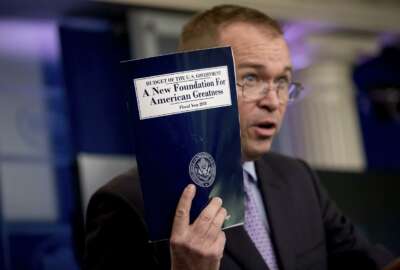
OMB’s Mulvaney: Agency’s budget increase will help with reorganization responsibilities
Office of Management and Budget Director Mick Mulvaney said his agency's budget reflects the priorities of the overarching fiscal 2018 budget.
When it comes to OMB, most people know the “management” and “budget” functions of the office, but few are familiar with the “R”: regulatory affairs.
That third leg of the office isn’t often considered, said OMB Director Mick Mulvaney, but it’s a major reason why the fiscal 2018 budget for the agency is one of the few among the executive branch agencies to see an increase.
“You will see us spending more money on places that are the president’s priorities and less elsewhere, just as we did with the rest of the budget,” Mulvaney said during a June 21 House Appropriations subcommittee hearing.
“We have the Office of Information and Regulatory Affairs [OIRA], and also within OMB is the Office of Performance and Personnel Management [OPPM]. OIRA and OPPM are the agencies within OMB, within the [Executive Office of the President], that are primarily responsible for two of the president’s highest priorities,” Mulvaney said. “This is the executive order that deals with the reorganization of the executive branch of the government, and the executive order that deals with the deregulation of the government … through two out before one comes in.”
The president’s proposed fiscal 2018 budget for the Office of Management and Budget is around $103 million, which is an 8 percent increase over 2017, and one of the few agency-wide increases proposed for next year’s budget.
“If you look at ITOR, keep in mind OMB also includes ITOR, the IT Oversight and Reform [fund] … the OMB number is actually up 5 percent, but the overall EOP — the Executive Office of the President, of which OMB is a piece — is 3 percent down from 17 enactment levels,” Mulvaney said.
The money in part would cover the hiring of 30 new full-time equivalent positions, which Mulvaney said are not political positions, and the 495 total FTEs at the agency would still be lower than the 2010 high.
A ‘microcosm’ of a larger budget
Despite Mulvaney’s justification, most subcommittee members’ opinions on the director’s budget justification leaned toward skepticism and criticism.
“As I’m sure you’re aware, OMB already receives $95 million for the past two years, exceeding the highest appropriation level for OMB in its history by $2 million,” said Rep. Nita Lowey (D-N.Y.). “This budget would set a new record for OMB funding, this time by an even larger margin, while all other federal agencies are being instructed to scale back. Director Mulvaney, I’ll be frank; you boost your department at the expense of hardworking taxpaying families.”
Committee members discussed OMB’s budget increase largely in the context of the overall proposed budget, which proposes $607 billion in defense discretionary spending and $560 billion in non-defense discretionary spending for fiscal 2018.
As the administration indicated in its “skinny budget,” Trump proposed $54 billion in reductions to non-defense discretionary spending in fiscal 2018 to offset boosts to the defense budget.
Those reductions come, in part, from changes to Medicaid, the Supplemental Nutrition Assistance Program (SNAP), student loans, the Earned Income Tax Credit and Child Tax Credit programs. It redirects some foreign aid spending and eliminates others. It also assumes savings from the repeal and replacement of the Affordable Care Act.
“I see the OMB EOP budget as simply a microcosm of the larger budget,” Mulvaney said. “Yes, money is spent there and money is reduced in other places along the lines of the priorities of this president. When you look at the OMB EOP budget, you’re sort of looking at it through the same perspective that we look at the larger budget; at the same time that same general perspective we brought of looking at taxpayers first, looking at spending through the eyes of the taxpayer, we used on our own budget.”
Rep. Mike Quigley (D-Ill.), however, said the overarching budget does not fight for families, nor does it put the American people first.
Instead, it’s made up of “rather cruel spending cuts that can destroy job-creating programs, weaken our national security efforts and strip support and resources from our most vulnerable individuals,” Quigley said.
Rep. Kevin Yoder (R-Kan.) voiced his concerns about cuts to the National Institutes of Health. Congress approved a $2 billion increase for NIH in the 2017 omnibus.
“We spend $30 billion annually on medical research at the federal level, yet we’re facing by 2050 a $1.1 trillion price tag for Alzheimer’s alone,” Yoder said. “There’s 10,000 known diseases in the world, we have the cures to 500 of them. To me, Director Mulvaney, this is fiscal conservatism, this is saving lives, this is bending the cost curve on Medicare and Medicaid by curing things like Alzheimer’s and cancer.“
Transparency and a higher debt ceiling
Rep. David Young (R-Iowa), pointed out that OMB was taking on a lot of new responsibilities when it comes to regulations and reform.
“It’s a priority of the administration to tackle the regulatory regime, it’s a priority of many members of Congress, it’s a priority of the American people. I hear about it all the time back home, particularly how those who are regulating us, they don’t know who they are; they’re nameless, they’re faceless,” Young said. “Transparency, I think, is a key that you should consider factoring in when it comes to reforming our regulatory process.”
Holding up the fiscal 2018 budget book, Young pointed to the list of 500 names who contributed to the document, and suggested implementing a mandate that those who write rules and regulations have to put their name on them. Young said he proposed a bill to do just that.
Mulvaney said he would be happy to look at the legislation.
The OMB director also addressed reports about conflicting views between himself and Treasury Secretary Steve Mnuchin on a “clean” bill to raise the debt ceiling.
The Associated Press reported that Mnuchin indicated he would like a bill to raise the debt ceiling that isn’t tied to spending reforms.
Mulvaney said that while he had voiced his preference for attaching spending reforms to the bill during an earlier hearing, when it comes down to it, both men want Congress to take up the idea of raising the ceiling before the August recess.
Copyright © 2024 Federal News Network. All rights reserved. This website is not intended for users located within the European Economic Area.
Related Stories





